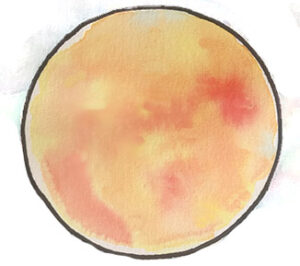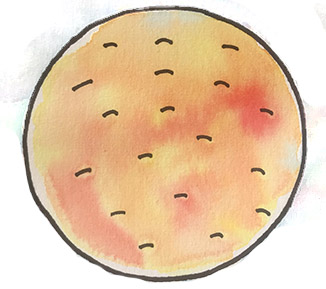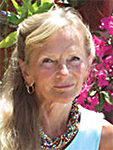Seeking Purpose: A Meditation
The WOW Factor:
Words of Wisdom from Wise Older Women
By Bonnie Lee Black (Gabon 1996-98)
|
At the beginning of each new semester when I taught English 101 at UNM in Taos, New Mexico, I would draw a huge circle on the front board, while the semicircle of first-year students sat and stared. “This is the world,” I’d say, patting the circle. “And these . . .
” I quickly marked the circle with lots of short, horizontal dashes “— are problems in the world. As I see it, our job as individuals – our personal purpose – is to seek out one of those little negatives and turn it into a positive, using all the intelligence, talents, heart and soul we’ve been given.” I scanned the room to read the students’ reactions. Their faces looked blank —what we used to call “subway faces” in New York — registering nothing, neither acceptance nor rejection, neither positive nor negative. “Maybe you’re wondering what all this is . . .” I patted the circle on the board again . . . “ has to do with English 101,” I’d say. I knew many of my students were the first in their families to attend college, even this two-year community college; many were Hispanic, and English had never been their favorite subject in school. “To succeed in life, as human beings and responsible citizens of the world, to fulfill our purpose and reach our personal goals, I strongly believe, we must first become educated. We must learn how to think like never before. This is why college and university is called ‘higher education.’ It’s here in college where we learn critical thinking. Not how to be critical but how to really think. Thinking is critically important.” Again, I studied faces. Some were quizzical. Some looked skeptical. I pressed on. “So how exactly do we learn how to think? And how do we show, or prove, what we’ve been thinking? In this course we’ll approach this by doing a lot of reading, speaking, writing, and sharing. We’ll do all this in English, because that happens to be the official language of this country. If we were in Mexico, we’d use Spanish, or if we were in France, we’d use French. Language is just a tool for expressing our thoughts, and English is just one of the world’s many languages.” I was an adjunct instructor at UNM for ten years, and all together in those years I had about a thousand students. Whether or not my little introductory pep talks made any difference for any of my students in the long run, I’ll never know. But I do know that it seemed easier to talk with young people then about “purpose” than it is to bring up the subject with older people now. Why is this, I wonder? Have we in la tercera edad (the third age, or stage, of life) given up? Do we feel we’ve served our purpose and there’s not much more for us to do? (Due, perhaps, to the endemic ageism in the American culture?) Has retirement from the corporate world – or seeing our children go off into the world – left us with a sense of purposeless now? Looking back, I know there have been many times in my life when I’ve had a strong sense of purpose, which made me deeply happy. Serving in the Peace Corps was one time. Teaching at UNM was another. Neither of these pursuits paid well; as a Peace Corps volunteer I got a small monthly living allowance, and as an adjunct college instructor, I earned pittance. Clearly, the remuneration for meaningful purposes is not necessarily in dinero. I’ve been grappling more than ever before lately with the concept of purpose, and I like to think I’m not alone in this. What is the work that we older people are charged to do in this crazy, mixed-up world (So many negative marks on that big circle!), while we still have time on this earth to do it? And, speaking personally, what more should I be doing now? It seems to me this issue deserves some serious – yes, critical – thinking. As ever in my life, I’ve looked to books for guidance. I recently found and read several short, helpful how-to’s on the subject of finding one’s purpose. The most practical and useful of these in my opinion was Live Your Passion Find Your Purpose In it Degnan writes:
This week a friend shared with me an interview she’d viewed recently with the eminent journalist Christiane Amanpour in which Amanpour talks about the importance of purpose. “You must have a dream,” Amanpour says. “You must have a sense of purpose. You must want to do something that is really worthwhile in the world in which we live.” This sense, this drive, I believe, must be timeless. I’d love to hear from you. Are you seeking purpose too? If so, how, and where? Have you found your later-in-life purpose? If so, what is it, and what does it mean to you? I invite you to contribute to the conversation in the Comments section for everyone’s benefit. Muchisimas gracias! •
Bonnie Lee Black (Gabon 1996-98) is the author of many published essays, as well as five published books: Sweet Tarts for My Sweethearts: Stories and Recipes from a Culinary Career; a historical novel, Jamie’s Muse, based on the lives of her Scottish great-grandparents who emigrated to South Africa in the late 19th century; and three memoirs about her own life-changing experiences in various Africa countries (www.bonnieleeblack.com). An honors graduate of Columbia University in New York (B.A.) and Antioch University in Los Angeles (MFA), Bonnie taught English and Creative Writing at the University of New Mexico’s Taos branch for ten years. Now retired and living in San Miguel de Allende, Mexico, she writes an award-winning weekly blog called The WOW Factor about the ex-pat life there (www.bonnieleeblack.com/blog/). |




Bonnie,
We read and hear stuff about goals, purpose, aims, etc all the time. Aimlessness maybe has become a way of being for
many who are starting out and seeking to find a place worth standing in the world. One of the guidelines used to be the “American Dream,” I believe. In our times, the American Dream, has just about mythed itself out. Where does a young woman or man go, or rather what destinations are they to seek through their mental maps, even if they truly have any.
The “American Dream” embodies many values like character, discipline, stability, family, patriotism, monetary success, overcoming odds, rising in social standing, acquiring wealth, etc., all of which imply earning and deserving. And there are many who are ok and appear to have taken the road not taken. Some of them don’t worry about now, but what is to become of me and mine when the plant closes.
Well, thank you for providing this opportunity to speak. Your blog with Mr. Coyne touched me, stuck to me, so to speak and has led me to respond by preaching. At 81 years of age I am once again trying to find a roadway.
Hank Skelton
Peace Corps Ethiopia 1964-1968
.
Thank you so much for your thoughts, Hank. I’m so glad to know this blogpost touched you. Yes, we all need a sense of purpose — right to the end. There’s so much that needs to be done, and we’re still in a position to help to do it. Best wishes, Bonnie
Bonnie, thanks for posing the question. For some of us now burdened with ill health (cancer, AIDS) we continue to find purpose in bringing a memento mori to the table. Many procrastinate needlessly on things of great importance. We, the sick, and the disabled, are a reminder that that bell tolls for each of us. Do today what your passion tells you is important. Tomorrow is promised to no one and soon some of us will not be here to serve as any kind of lesson. Live in the now.
Thank you so much, Michael, for your words of (hard-earned) wisdom. Yes, we mustn’t procrastinate; there’s so much to do, and we must do it asap. Best wishes to you, Bonnie
Bonnie,
I just read your WOW piece. As a psychiatrist, I have spent a lot of time listening for what their passions are as a venue to initiate change in their lives.
Sometimes it is very sad, but sometimes it leads to them seek their passions or create a new one.
I just turned eighty and have found a new passion, which I would like to tell you about. If you were to send me an email contact, I would like to share with you my new passion, which is actually very old one in that it started with my Peace Corps experience in Malawi 64-66.
I read you book on how to cook a crocodile … been looking for one to put in pot ever since.
There’s nothing like writing your memoirs to discover how you became who you are today and guide you on your path as you age. I spent 32 years working in K-12 education (and some university teaching), don’t regret the lower pay, and still value learning. It helps to be brought up close to nature, like I was in a small Montana town, and to learn what you want early in life. Having success at being who you were meant to be gives you self confidence to overcome obstacles and find your purpose.My time in the Peace Corps helped me see more of what I might accomplish in my life–even when I hit some detours. If interested, my life’s path is laid out in all its glory and detours in my two memoirs. The one about my time in the Peace Corps in Peru is called Between Inca Walls.